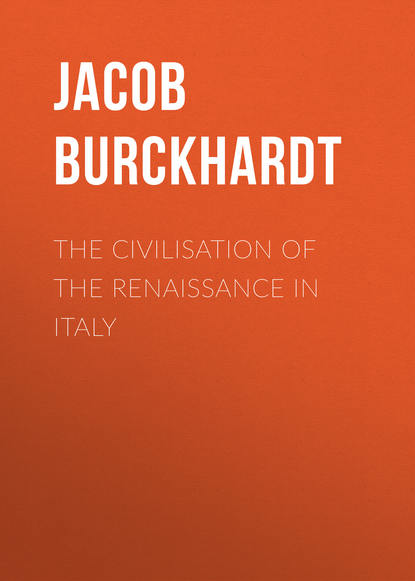По всем вопросам обращайтесь на: info@litportal.ru
(©) 2003-2024.
✖
The Civilisation of the Renaissance in Italy
Настройки чтения
Размер шрифта
Высота строк
Поля
1175
Who tells it us himself. Benedictus, in Eccard, ii. col. 1617.
1176
In this sense we must understand the words of Jac. Nardi, Vita d’Ant. Giacomini, p. 65. The same pictures were common on clothes and household utensils. At the reception of Lucrezia Borgia in Ferrara, the mule of the Duchess of Urbino wore trappings of black velvet with astrological figures in gold. Arch. Stor. Append. ii. p. 305.
1177
Æn. Sylvius, in the passage quoted above p. 508; comp. Opp. 481.
1178
Azario, in Corio, fol. 258.
1179
Considerations of this kind probably influenced the Turkish astrologers who, after the battle of Nicopolis, advised the Sultan Bajazet I. to consent to the ransom of John of Burgundy, since ‘for his sake much Christian blood would be shed.’ It was not difficult to foresee the further course of the French civil war. Magn. Chron. Belgicum, p. 358. Juvénal des Ursins, ad. a. 1396.
1180
Benedictus, in Eccard, ii. col. 1579. It was said of King Ferrante in 1493 that he would lose his throne ‘sine cruore sed sola fama’—which actually happened.
1181
Comp. Steinschneider, Apokalypsen mit polemischer Tendenz, D. M. G. Z. xxviii. 627 sqq. xxix. 261.
1182
Bapt. Mantuan. De Patientia, l. iii. cap. 12.
1183
Giov. Villani, x. 39, 40. Other reasons also existed, e.g. the jealousy of his colleagues. Bonatto had taught the same, and had explained the miracle of Divine Love in St. Francis as the effect of the planet Mars. Comp. Jo. Picus, Adv. Astrol. ii. 5.
1184
They were painted by Miretto at the beginning of the fifteenth century. Acc. to Scardeonius they were destined ‘ad indicandum nascentium naturas per gradus et numeros’—a more popular way of teaching than we can now well imagine. It was astrology ‘à la portèe de tout le monde.’
1185
He says (Orationes, fol. 35, ‘In Nuptias’) of astrology: ‘haec efficit ut homines parum a Diis distare videantur’! Another enthusiast of the same time is Jo. Garzonius, De Dignitate Urbis Bononiae, in Murat. xxi. col. 1163.
1186
Petrarca, Epp. Seniles, iii. 1 (p. 765) and elsewhere. The letter in question was written to Boccaccio. On Petrarch’s polemic against the astrologers, see Geiger. Petr. 87-91 and 267, note 11.
1187
Franco Sacchetti (nov. 151) ridicules their claims to wisdom.
1188
Gio. Villani, iii. x. 39. Elsewhere he appears as a devout believer in astrology, x. 120, xii. 40.
1189
In the passage xi. 3.
1190
Gio. Villani, xi. 2, xii. 58.
1191
The author of the Annales Placentini (in Murat. xx. col. 931), the same Alberto di Ripalta mentioned at p. 241, took part in this controversy. The passage is in other respects remarkable, since it contains the popular opinion with regard to the nine known comets, their colour, origin, and significance. Comp. Gio. Villani, xi. 67. He speaks of a comet as the herald of great and generally disastrous events.
1192
Paul. Jov. Vita Leonis xx. l. iii. where it appears that Leo himself was a believer at least in premonitions and the like, see above p. 509.
1193
Jo. Picus Mirand. Adversus Astrologos, libri xii.
1194
Acc. to Paul, Jov. Elog. Lit. sub tit. Jo. Picus, the result he achieved was ‘ut subtilium disciplinarum professores a scribendo deterruisse videatur.’
1195
De Rebus Caelestibus, libri xiv. (Opp. iii. 1963-2591). In the twelfth book, dedicated to Paolo Cortese, he will not admit the latter’s refutation of astrology. Ægidius, Opp. ii. 1455-1514. Pontano had dedicated his little work De Luna (Opp. iii. 2592) to the same hermit Egidio (of Viterbo?)
1196
For the latter passage, see p. 1486. The difference between Pontano and Pico is thus put by Franc. Pudericus, one of the interlocutors in the dialogue (p. 1496): ‘Pontanus non ut Johannes Picus in disciplinam ipsam armis equisque, quod dicitur, irrumpit, cum illam tueatur, ut cognitu maxime dignam ac pene divinam, sed astrologos quosdam, ut parum cautos minimeque prudentes insectetur et rideat.’
1197
In S. Maria del Popolo at Rome. The angels remind us of Dante’s theory at the beginning of the Convito.
1198
This was the case with Antonio Galateo who, in a letter to Ferdinand the Catholic (Mai, Spicileg. Rom. vol. viii. p. 226, ad a. 1510), disclaims astrology with violence, and in another letter to the Count of Potenza (ibid. p. 539) infers from the stars that the Turks would attack Rhodes the same year.
1199
Ricordi, l. c. n. 57.





